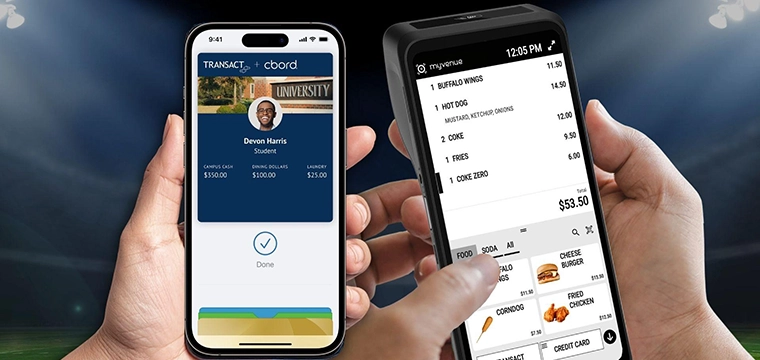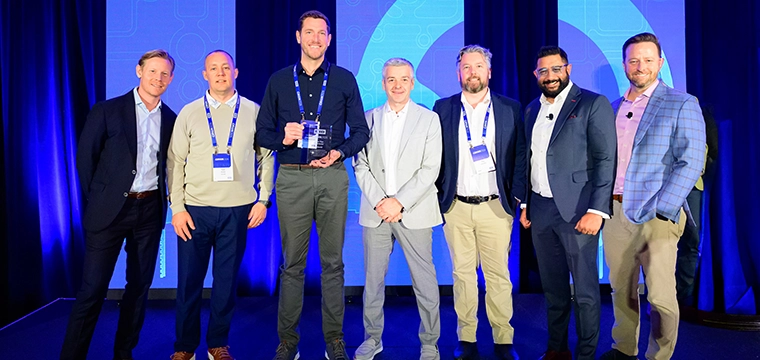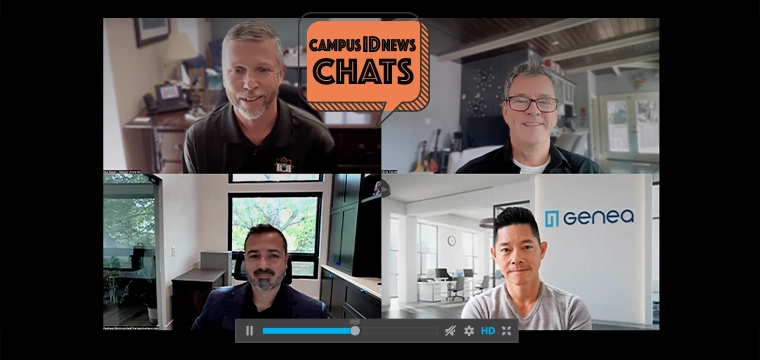Auxiliary service leader sees biometrics as next step beyond mobile credential
In a move to modernize campus access, University of California at Irvine trialed Amazon One, a contactless biometric system that uses palm vein recognition for identity verification.
Wayne Fields, UC Irvine’s Assistant Director for Student Affairs IT, says he was inspired by a visit to Whole Foods where he saw the biometric devices in action. He’d been looking for a way to streamline access on campus, and he thought this might be the answer.
His goal was to find a faster, more secure way for students to access campus services – especially dining halls – without needing to present a card or phone.
The university already partnered with Amazon Web Services (AWS), so acquiring the necessary hardware was a straightforward process. Over the summer, the pilot was launched in campus dining facilities, and the response from students was overwhelmingly positive.
UC Irvine has 9,000 new students each year and 17,000 residents on campus, most of which have a meal plan. Enrollment of all those people will be a challenge so a self-enrollment option is key.
Amazon One's contactless palm vein technology offered a quick, secure, and hygienic alternative to ID cards. Students were eager to try the new system, while Amazon welcomed the opportunity to gather real-world feedback.
He says the biometric project aligns with broader institutional goals of sustainability and cloud-based solutions. As part of the University of California’s sustainability initiative, the campus is transitioning from on-prem servers to cloud-based infrastructure.
“I think that folks should keep their eye on the cloud-based technologies and where they're evolving,” he says. “That's really where we need to get to.”
Transcript:
I first learned about Amazon One by going to the Whole Foods store and at the time Amazon was trying to do their Amazon Go grocery stores and they've kind of stopped that effort.
But what interested me was that they had this hardware that I saw was contactless and in my mind I was like, okay, fingerprint readers are very, you know, they're everywhere, right?
They're pretty across the board, but you have to still touch it. And coming out of the pandemic I was like, what type of contactless technology similar to mobile can we use but is going beyond mobile credential?
Because I see biometrics as the next logical step where students don't actually have to present anything other than themselves to verify their identity.
And so that's really what started me thinking about, well, can I get some type of this hardware? Our campus has an agreement with AWS and I reached out to our representative and said, hey, can you get me some terminals, I'd like to test this in dining.
And so that's how we got the ball rolling.
So last summer we partnered with Amazon One to bring in their hardware to our dining halls to do a pilot program to see the adoption among students and whether we could get them into the dining hall faster than is currently happening with their cards or their phones, scanning the QR code.
So what we found is that students were really excited about this and Amazon was very excited to learn, you know, what it is that students are looking for, what could they do better.
Over the course of the summer we came up with a list of lessons learned to try to give Amazon some ideas for their future roadmap.
Well, I think what we're seeing now is you're starting to see everyone really rushing the gold rush of mobile credentials, right?
We've moved away from plastic, we've moved away from mag stripes, we're moving away from barcodes and mobile credentials is where everybody's going.
But I'm already thinking past that, right? I'm thinking like beyond mobile credential, biometric is the next thing.
Now, facial is problematic. A lot of campuses tried facial, but there's been a lot of pushback because of privacy and security reasons.
And so I thought, you know, the palm vein technology is more accurate.
And it's not as problematic in that students will have full control through Amazon to delete their template at any time or to share their template between our campus and let's say the local Whole Foods.
So if they want to go shopping, they can basically go into Amazon one app and say share my template.
And when they walk into Whole Foods, if they've got a credit card tied to their account, they can make purchases there.
So this is where I see things are really going to progress to. It's much easier, less friction.
On our campus, I see a very definite digital divide between the students and the staff and the faculty.
And it's really funny because the students during the Amazon One pilot, they were jazzed, they were excited. They were like, this is new, this is cool, we want to try this. And when we told HR, we want to bring this for staff and the faculty, we're pushing back. The faculty are already like, we need a physical ID, we have to visually verify students based on their photo.
And I'm like, but you have a biometric that's literally been verified.
So this digital divide, it's kind of funny for me to see the students are all embracing the technology, but the staff and the faculty are not there yet, they're not in that place.
So it's a constant education process.
I guess one of the points that really sold us is that it is all cloud based.
Our campus is really, we just entered into a contract with Amazon to literally forklift all of our on premise servers into the cloud.
And so over the course of the next year, we're really pushing from a sustainability point.
The University of California has sustainability goals that they're trying to meet.
And part of it is moving servers into the cloud, reducing energy costs.
And I think that products that speak to cloud based are really where people should be heading.
There are some vendors out there that are still doing some on prem things, but I don't agree that that's the right pathway.
So I think that folks should keep their eye on really the cloud based technologies and where they're evolving and they're getting more security because that's really where we need to get to.
So I think that's the right pathway.




